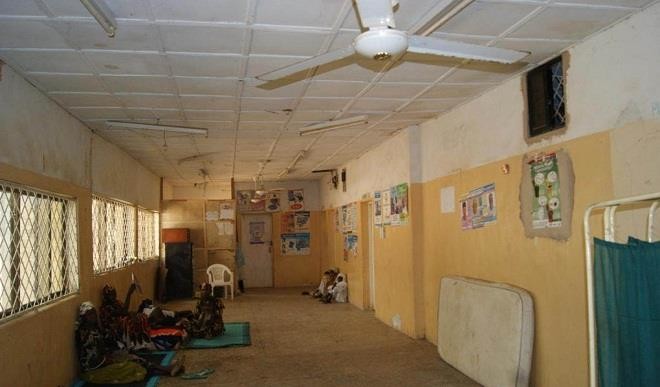The stories are beginning to sound the same and are coming from different parts of the country. A mother, a father, a wife, a husband, a child not given medical attention according to pain-drenched reports.
Lives are lost almost daily – but not to COVID-19. Not to the novel coronavirus that has been aggressively sweeping across the world since late 2019.
These deaths unfortunately are from other disease conditions like diabetes, asthma, and heart disease.
As a family physician, I have several times seen up close the hopelessness, despair and devastation that arise following the death of a loved one. The stages of grief that manifest – the shock, anger, denial, bargaining, depression and finally painful acceptance.
However, most often preceding these turbulent emotions are usually furtive and desperate attempts from healthcare workers to do everything necessary to save that life that is hanging in the balance.
Sadly, in the wake of COVID-19, many of our hospitals cannot offer these patients a fighting chance, and a major reason for this is the lack of personal protective equipment or PPE.
Since the onset of the global pandemic of COVID-19, shortages in PPE have bedevilled many a country’s response to the virus outbreak, and according to the World Health Organization (WHO), escalating disruptions to the global supply of PPE endanger more lives from not only the new coronavirus, but other infectious diseases.
These equipment – gowns, aprons, masks, face shields, goggles and gloves are what healthcare workers rely on to protect themselves and their patients from being infected and infecting others.
Unfortunately, these are in very short supply, and these shortages are leaving doctors, nurses and other frontline workers who are our first line of defence dangerously ill-equipped to care for any patients at all.
The Nigeria Medical Association and Nigerian Association of Nurses and Midwives have raised outcries on the huge shortages of PPEs in non-coronavirus-designated facilities. Given the active community spread of the infection, all patients must initially as a precaution be deemed possibly infected with the virus, necessitating universal precautions for all patients.
The controversy surrounding availability of PPE is not peculiar to Nigeria, because even in advanced climes such as the United States, doctors, nurses and other frontline health workers have held protests begging or demanding for these life-saving equipment to be provided them.
In fact, in many of those hospitals, due to limited availability, health workers are being asked to reuse their medical masks, which is of course a very dangerous practice in infection prevention and control.
In many hospitals across America, health workers have even been threatened with job losses in the event they continue to speak out about a lack of such equipment.
It therefore comes as no surprise that over 9,000 health workers in the US have become infected with COVID-19, a figure which is three times the number recorded by health workers in China.
In another clime, since the pandemic, doctors in some parts of India have been reportedly forced to use raincoats and motorcycle helmets as protection.
In Nigeria, more than a hundred health workers have become infected out of just over 2,000 confirmed cases and that number is set to increase exponentially if PPEs are not made more widely available in all healthcare facilities in the country.
Current market price estimates reveal that kitting a hospital which has a complement of up to 50 doctors with adequate PPE could require up to N1.25 million daily.
In a survey conducted following the Ebola outbreak in West Africa, only 43.6% of respondents acknowledged the availability of PPE in their hospitals – and of this number, the better results were mostly for public hospitals (74.4%), with private hospitals accounting for a meagre 16% of PPE supplies, and primary health care centres receiving only about 9.6%.
A similar dynamic appears to be playing out in the COVID-19 outbreak, with health facilities not directly involved with the care and treatment of COVID-19 patients not being equipped with PPE.
Unfortunately, as active community spread of the virus continues even from asymptomatic individuals, people will necessarily continue to seek out healthcare services for other needs – antenatal care, routine immunisation, medications for chronic conditions such as diabetes, hypertension and HIV, and even surgical attention for severe injuries.
The lack of PPE in hospitals and clinics will necessitate the scaling back of these services and even the shutting of their doors in many cases, possibly leading to a resurgence of outbreaks of killer infections like measles, meningitis, polio and yellow fever and of course raise numbers of avoidable deaths from some of these non COVID-19 ailments.
What then happens to the 65-year old who suddenly goes into a diabetic coma following a bout of malaria? Or the 26-year old expecting her first baby who starts bleeding unexpectedly? What care would be available for the 7-year old avid football fan who suddenly goes into a crisis from sickle cell disease? Or the victims of acts of violent crimes?
Such random possibilities highlight the fact that while COVID-19 is undoubtedly a clear and present danger to us all, we need not lose sight of the other illnesses and conditions our health system is daily confronted with and the many lives that could be lost if we ignore this critical fact.
Given the global demand and supply dynamics that have followed the COVID-19 pandemic, national and sub-national leadership must prioritise the creation and enhancement of an enabling environment for the domestic manufacture of these protective equipment.
Several indigenous Nigerian manufacturers from Cross Rivers to Aba in Abia, to countless tailors in many large cities such as Abuja and Lagos and indeed even the Nigerian military have taken up this task and should be supported in order to boost local production.
Given that countries in Europe and North America with substantially higher purchasing power are clamouring for these same items in what has been referred to as a “war of the masks”, it is obvious that home-grown solutions are Nigeria’s primary hope for a sustainable source of protection.
Secondly, the distribution of PPE cannot be lopsided, and so systematic methods for ensuring their distribution across the three levels of healthcare – primary care centres, district hospitals and teaching hospitals in both the public and private sectors are crucial and must therefore be put in place.
In Nigeria, primary healthcare centres account for about 88% of all health facilities, and the private sector provides over 30% of the healthcare given to Nigerians.
As lockdowns begin to ease, a robust outbreak response would be needed to ensure a limited spread of this disease, and so the provision of adequate PPEs and the trainings on its use can therefore not exclude primary healthcare facilities or the private sector.
Many committed health workers have sworn an oath to battle to save the lives of their patients and do no harm. However, for as long as life-saving equipment like PPEs are not available to these front-line workers to protect themselves and their patients from infection, we are asking them to do just that – to do harm in the process of giving care, and no health worker should be asked to do that.
In the words of Dr Tedros Ghebreyesus, Director-General of the World Health Organization, “No one is safe until everyone is safe”. By ensuring that PPEs are made available across the entire health system, we are safeguarding the lives of all our people, ensuring that Nigeria can stand a fighting chance in this current battle for health and for life.
Dr Adaeze Oreh is a family physician in Abuja and a public health expert. She is also a Senior Aspen New Voices Fellow with the Aspen Institute in Washington D.C.

 Join Daily Trust WhatsApp Community For Quick Access To News and Happenings Around You.
Join Daily Trust WhatsApp Community For Quick Access To News and Happenings Around You.


